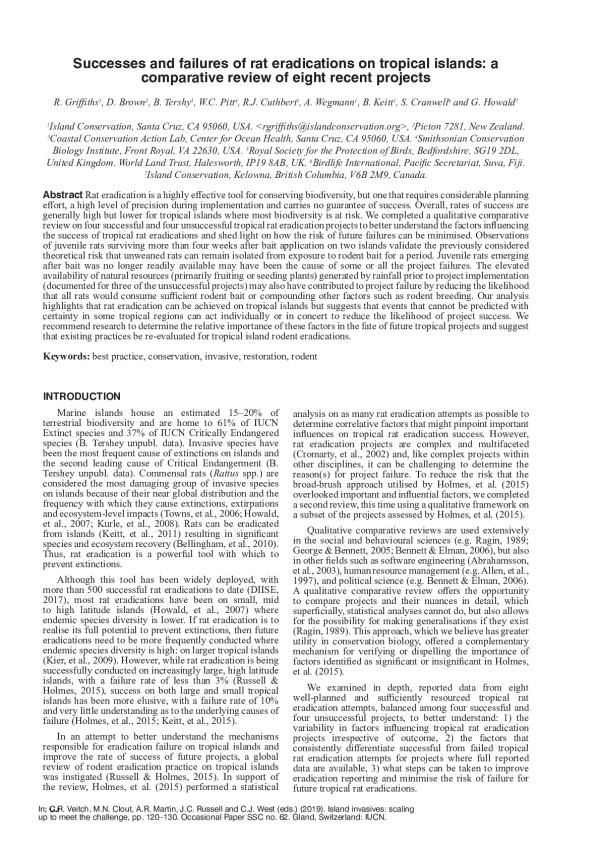Localisation
SPREP LIBRARY
Éditeur
International Union for Nature Conservation (IUCN)
Année de publication:
2019
Lieu de publication
Gland, Switzerland
Description physique:
11 p.
Numéro d'appel
[EL]
Pays concernés
Pacific Region
Worldwide
Type de contenu
Langue
English
Identifiant de dossier:
654
Ancien numéro d'identification PEIN:
82533
Notes générales
Available online
Disponible en ligne
Rubrique(s) thématique(s)
Invasive species
Résumé
Rat eradication is a highly effective tool for conserving biodiversity, but one that requires considerable planning effort, a high level of precision during implementation and carries no guarantee of success. Overall, rates of success are generally high but lower for tropical islands where most biodiversity is at risk. We completed a qualitative comparative review on four successful and four unsuccessful tropical rat eradication projects to better understand the factors influencing the success of tropical rat eradications and shed light on how the risk of future failures can be minimised. Observations of juvenile rats surviving more than four weeks after bait application on two islands validate the previously considered theoretical risk that unweaned rats can remain isolated from exposure to rodent bait for a period. Juvenile rats emerging after bait was no longer readily available may have been the cause of some or all the project failures. The elevated availability of natural resources (primarily fruiting or seeding plants) generated by rainfall prior to project implementation (documented for three of the unsuccessful projects) may also have contributed to project failure by reducing the likelihood that all rats would consume sufficient rodent bait or compounding other factors such as rodent breeding. Our analysis highlights that rat eradication can be achieved on tropical islands but suggests that events that cannot be predicted with certainty in some tropical regions can act individually or in concert to reduce the likelihood of project success. We recommend research to determine the relative importance of these factors in the fate of future tropical projects and suggest that existing practices be re-evaluated for tropical island rodent eradications.
Programme(s):
Localisation
SPREP LIBRARY
Éditeur
International Union for Nature Conservation (IUCN)
Année de publication:
2019
Lieu de publication
Gland, Switzerland
Description physique:
11 p.
Numéro d'appel
[EL]
Pays concernés
Pacific Region
Worldwide
Type de contenu
Langue
English
Identifiant de dossier:
654
Ancien numéro d'identification PEIN:
82533
Notes générales
Available online
Dossier créé: 31-May-2019
Dossier modifié: 16-Feb-2022

